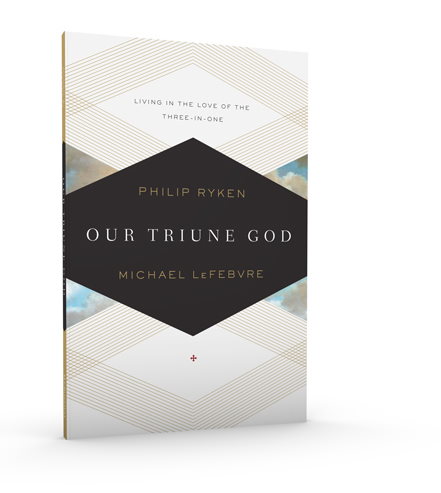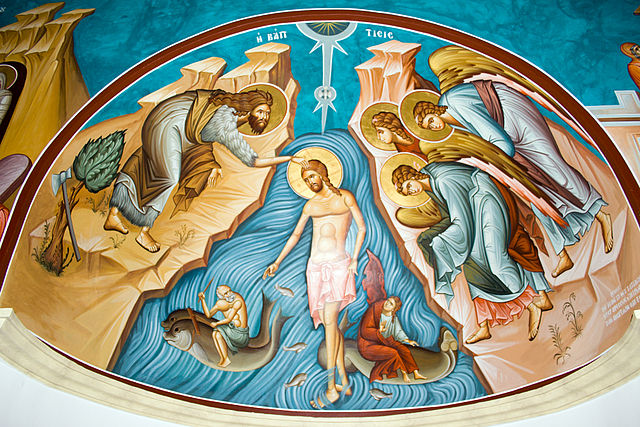Podcast: Play in new window | Download
Subscribe: Spotify | Email | RSS
In this episode I ask whether this short, introductory book on the Trinity, Our Triune God: Living in the Love of the Three-in-One by Philip Ryken and Michael LeFebvre, answers the ten (or nine) basic questions we explored last time. I score the book based on how many are clearly answered, as opposed to either being ignored or answered in an utterly confusing fashion. One of this last sort is the question of just what this doctrine is. Ryken and LeFebvre write,

For all its complexity, the biblical doctrine of the Trinity can be stated in seven simple propositions:
1. God the Father is God.
2. God the Son is God.
3. God the Holy Spirit is God.
4. The Father is not the Son.
5. The Son is not the Spirit.
6. The Spirit is not the Father.
7. Nevertheless, there is only one God.
I explain why this list is not enough to clarify what “the doctrine of the Trinity” is, and how their presentation overall leaves the careful reader baffled about what it is supposed to be.
We also explore, among other issues, how they try to show how the New Testament teaches a triune God. Along the way I discuss the “see three” fallacy and what I call the myth of the three eternal amigos.
Links for this episode:
Luke 3:21-22; Ephesians 1:1-14; Acts 7:59-60; John 14:22-23; John 17:1-3; 1 John 1:3; Luke 9:28-36; Exodus 34:30-35 ; 2 Peter 1:16-18; Luke 10:21; Luke 1:41; Matthew 16:13-20.
podcast 314 – 10 Fundamental Questions about the Trinity
podcast 302 – The Stages of Trinitarian Commitment
podcast 260 – How to Argue that the Bible is Trinitarian
God and his Son: the logic of the New Testament
“Trinity” (by analytic theologians): Baber, Howard-Snyder, Tuggy
the evolution of my views on the Trinity
podcast 5 – Anglicans Defending “Athanasius”
podcast 4 – Anglicans vs. “Athanasius”
podcast 2 – the “Athanasian Creed”
podcast 253 – The Apostle Paul a Unitarian
podcast 26 – Pastor Sean Finnegan on “the Holy Spirit” – Part 2

podcast 25 – Pastor Sean Finnegan on “the Holy Spirit” – Part 1
podcast 227 – Who Should Christians Worship?
podcast 189 – The unfinished business of the Reformation
podcast 190 – What is the Trinity? A triad of book reviews
podcast 277 – Was Christ tempted in every way?
podcast 145 – ‘Tis Mystery All: the Immortal dies!
podcast 218 – Dr. Jerry Walls on Roman Catholic and Christian Foundational Claims
This week’s thinking music is “High Above the Darkness (My Star)” by Admiral Bob.



How do you know that the being of God obeys the laws of logic that we are familiar with and which are consistent with knowledge gained from sensory perception?
Don’t you make assumptions about the trinitarian model that are based solely on your empirical knowledge of this world and what we can deduce from it?
Thanks for your questions, Paul.
In short, laws of logic are necessary truths; roughly, we know that be true no matter what, or as philosophers say “in all possible worlds.”
Because of this, any other laws there are must be consistent with these.
No, I don’t make any assumptions about “the Trinity” based on sense perception – none at all. My approach is to let the catholic Christian tell me what they mean by “the doctrine of the Trinity” – and then the discussion can proceed from there. See my “Trinity” entry in the Stanford Encyclopedia of Philosophy for some of the options. The traditional words leave many interpretations open, unfortunately.
It seems strange to claim that the word “God” is ambiguous.
If one has read the bible and the word God remains ambiguous it is really a poor state of affairs.
I would be left wondering what my brain had done with all the information.
Paul, it’s not strange at all; look up “theos” in a lexicon. Even proper names are often ambiguous; I have been aware of another “Dale Tuggy” in the world, and I’ll wager there is another “Paul Anchor” out there. I discuss the ambiguity of “theos” in some detail here: https://trinities.org/blog/podcast-224-biblical-words-for-god-and-for-his-son-part-1-god-and-god-in-the-bible/
“For who is God, save the LORD? And who is a rock, save our God?”
Aren’t the seven propositions referring to the same God as here defined?
Why the scepticism?
Comments are closed.